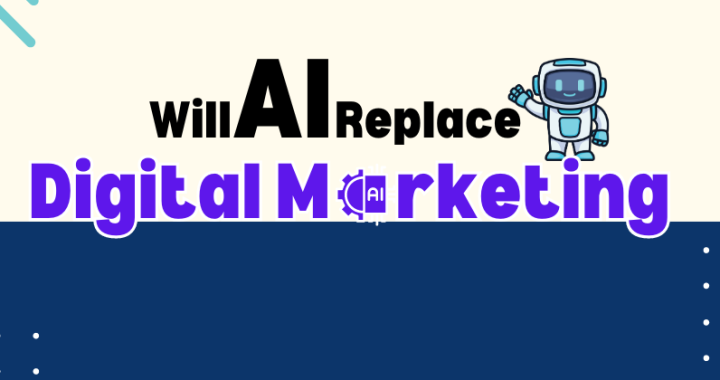In recent years, the rapid advancement of artificial intelligence (AI) has sparked debates across various industries about the future of work and the roles of humans versus machines. One area that has been particularly scrutinized is digital marketing. With the evolution of Ai technology will AI be responsible to replace digital marketing professionals altogether?
Understanding AI in Digital Marketing
Before delving into whether AI will replace digital marketers, it’s essential to understand how AI is currently being integrated into digital marketing strategies. AI in this context refers to the use of algorithms and machine learning techniques to analyze vast amounts of data, predict outcomes, and automate tasks that were previously handled by humans.
AI-Powered Analytics
One of the significant advantages of AI in digital marketing is its ability to process and analyze large datasets quickly. AI algorithms can sift through customer data, social media interactions, website traffic, and more to identify patterns and insights that human marketers might miss. This capability allows for more targeted marketing campaigns and personalized customer experiences.
Automation of Routine Tasks
Another area where AI excels is in automating repetitive tasks such as email marketing, social media posting, and content scheduling. Tools powered by Ai can analyze audience behavior in real-time and adjust marketing tactics accordingly, freeing up human marketers to focus on more strategic initiatives.
Predictive Insights
AI can also provide predictive insights based on historical data, helping marketers anticipate trends, forecast sales, and optimize advertising spend. This proactive approach enables businesses to stay ahead of the competition and make data-driven decisions with greater confidence.
Ai’s Impact on Digital Marketing Jobs
With AI’s capabilities in mind, it’s natural to question whether these technologies will replace human jobs in digital marketing. While AI is undoubtedly transforming the industry, its role is more complementary than substitutive.
Enhanced Efficiency
AI helps digital marketers to work more efficiently by providing actionable insights in real-time and automating time-consuming tasks. This efficiency boost enables teams to scale their efforts and achieve better results with fewer resources.
New Skill Requirements
As AI takes over routine tasks, the role of the digital marketer is evolving. Professionals are increasingly required to possess skills in data analysis, AI implementation, and strategy development. Rather than replacing jobs, AI is creating new opportunities for growth and specialization within the field.
Creative and Strategic Thinking
While AI can optimize processes and analyze data, it still lacks the creativity and strategic thinking that human marketers bring to the table. Crafting captivating brand stories, conducting innovative campaigns, and engaging with the people on a personal level are areas where human divination and empathy are unchangeable.
AI as a Collaborative Tool
Instead of viewing AI as a threat, many digital marketers are embracing it as a powerful tool for collaboration. By integrating AI into their workflows, teams can leverage its strengths while focusing on tasks that require human judgment and creativity.
Personalization at Scale
AI enables marketers to deliver personalized experiences at scale by analyzing consumer behavior and preferences. Whether through tailored recommendations, dynamic content creation, or predictive customer service, AI helps brands connect with their audiences on a deeper level.
Continuous Learning and Adaptation
One of the most significant advantages of AI is its capability to learn from interactivity and adapt to changing market’s condition in real-time. This agility allows marketers to refine their strategies on the fly and respond quickly to emerging trends or consumer feedback.
Ethical Considerations and Challenges
Despite its benefits, the widespread adoption of AI in digital marketing also raises ethical concerns and challenges that must be addressed.
Data Privacy and Security
AI relies on vast amounts of data to operate effectively, raising concerns about consumer privacy and data security. Marketers must navigate regulatory requirements and implement robust security measures to protect sensitive information.
Bias and Fairness
When AI systems are trained on biased data, they may unintentionally reinforce those biases, producing unfair or discriminatory results. Ensuring fairness and transparency in AI-driven decision-making processes is crucial to maintaining trust with consumers and avoiding reputational damage.
Human Oversight and Accountability
While AI can automate many tasks, human oversight is essential to ensure that decisions align with ethical standards and business objectives. Marketers must remain vigilant and actively monitor AI systems to mitigate risks and prevent unintended consequences.
The Ai’s future in Digital Marketing
Looking ahead, the future of AI in digital marketing appears promising yet complex. As technology continues to advance, so too will its impact on the industry.
Integration with Emerging Technologies
AI is expected to integrate with other emerging technologies such as augmented reality (AR), virtual reality (VR), and the Internet of Things (IoT) to create immersive and personalized experiences for consumers. These innovations will reshape how brands engage with their audiences and drive digital transformation across sectors.
Evolution of Consumer Behavior
As AI-driven experiences become more prevalent, consumer expectations will continue to evolve. Brands that can anticipate these changes and deliver seamless, personalized interactions will gain a competitive advantage in the marketplace.
Collaboration Between Humans and Machines
Digital marketing’s future ultimately depends on how well humans and technology work together. By harnessing AI’s analytical capabilities and creativity, marketers can unlock new opportunities for growth, innovation, and customer engagement.
Conclusion
In conclusion, while AI is transforming the landscape of digital marketing, it is unlikely to replace human marketers entirely. Instead, AI serves as a powerful tool for enhancing efficiency, personalizing experiences, and driving strategic decision-making. By embracing AI technologies responsibly and adapting to evolving consumer expectations, digital marketers can position themselves for success in a rapidly changing digital economy.AI in digital marketing harnesses data-driven insights to personalize customer experiences, optimize campaign effectiveness through predictive analytics, and automate tasks like customer service via chatbots. It facilitates content creation and curation at scale, enhances ad targeting, and empowers marketers with real-time optimization capabilities. Overall, AI enables marketers to make data-driven decisions, improve efficiency, and achieve better engagement and ROI in their digital strategies.
As the industry continues to evolve, the key to sustainable growth lies in finding the right balance between technological innovation and human expertise. By leveraging AI as a collaborative ally, digital marketers can navigate challenges, seize opportunities, and shape the future of marketing in the digital age.
